

Victorian Period - A Time of Change. "All art is at once surface and symbol.
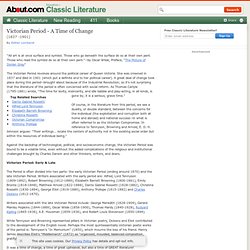
Those who go beneath the surface do so at their own peril. Those who read the symbol do so at their own peril. "--by Oscar Wilde, Preface, "The Picture of Dorian Gray" The Victorian Period revolves around the political career of Queen Victoria. She was crowned in 1837 and died in 1901 (which put a definite end to her political career). Of course, in the literature from this period, we see a duality, or double standard, between the concerns for the individual (the exploitation and corruption both at home and abroad) and national success--in what is often referred to as the Victorian Compromise.
Against the backdrop of technological, political, and socioeconomic change, the Victorian Period was bound to be a volatile time, even without the added complications of the religious and institutional challenges brought by Charles Darwin and other thinkers, writers, and doers. Victorian Period: Early & Late More Info. Victorian Literature - Literature Periods & Movements. Literature Network » Literary Periods » Victorian Literature Defining Victorian literature in any satisfactory and comprehensive manner has proven troublesome for critics ever since the nineteenth century came to a close.
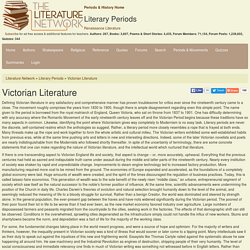
The movement roughly comprises the years from 1830 to 1900, though there is ample disagreement regarding even this simple point. The name given to the period is borrowed from the royal matriarch of England, Queen Victoria, who sat on throne from 1837 to 1901. One has difficulty determining with any accuracy where the Romantic Movement of the early nineteenth century leaves off and the Victorian Period begins because these traditions have so many aspects in common.
Likewise, identifying the point where Victorianism gives way completely to Modernism is no easy task. If there is one transcending aspect to Victorian England life and society, that aspect is change – or, more accurately, upheaval. This article is copyrighted © 2011 by Jalic Inc. English literature: The Victorian Age. The Reform Bill of 1832 gave the middle class the political power it needed to consolidate—and to hold—the economic position it had already achieved.
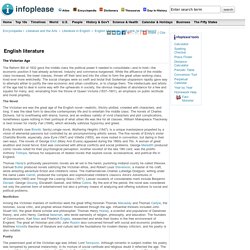
Industry and commerce burgeoned. While the affluence of the middle class increased, the lower classes, thrown off their land and into the cities to form the great urban working class, lived ever more wretchedly. The social changes were so swift and brutal that Godwinian utopianism rapidly gave way to attempts either to justify the new economic and urban conditions, or to change them.
Characteristics of Victorian Era Literature. Victorian literature. Herbert F.
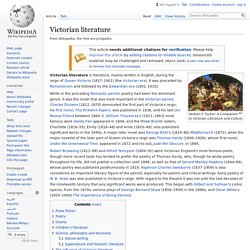
Tucker: A Companion to Victorian Literature and Culture Victorian literature is literature, mainly written in English, during the reign of Queen Victoria (1837–1901) (the Victorian era). It was preceded by Romanticism and followed by the Edwardian era (1901–1910). Robert Browning (1812–89) and Alfred Tennyson (1809–92) were Victorian England's most famous poets, though more recent taste has tended to prefer the poetry of Thomas Hardy, who, though he wrote poetry throughout his life, did not publish a collection until 1898, as well as that of Gerard Manley Hopkins (1844–89), whose poetry was published posthumously in 1918. Algernon Charles Swinburne (1837–1909) is also considered an important literary figure of the period, especially his poems and critical writings. Prose fiction[edit] The Victorian Period. The Victorian period formally begins in 1837 (the year Victoria became Queen) and ends in 1901 (the year of her death).
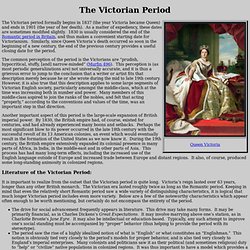
As a matter of expediency, these dates are sometimes modified slightly. 1830 is usually considered the end of the Romantic period in Britain, and thus makes a convenient starting date for Victorianism. Similarly, since Queen Victoria’s death occurred so soon in the beginning of a new century, the end of the previous century provides a useful closing date for the period. The common perception of the period is the Victorians are “prudish, hypocritical, stuffy, [and] narrow-minded” (Murfin 496). This perception is (as most periodic generalizations are) not universally accurate, and it is thus a grievous error to jump to the conclusion that a writer or artist fits that description merely because he or she wrote during the mid to late 19th century.